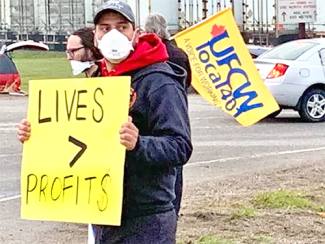GUINEA PIGGED
Workers fear being ‘guinea pigs’ in test to see if it’s safe to re-open

ASKING WORKERS TO BE OUR GUINEA PIGS IS ONE THING. Giving them no choice in the matter is quite another. But that’s the reality many thousands of our workers now face.
Our first instincts to combat COVID-19 were good. We shut down all “non-essential” work. This turned out to be particularly good for workers in high-risk jobs. Now we want to get back to work. We want to begin with workers in high-risk jobs. This is not so good.
Workers as guinea pigs
Many workers sense they are being forced to be our guinea pigs when we send them back into workplaces to see how many of them get sick and then use that as a measure of how safe it is to re-open everywhere.
It is true employers cannot force workers to go back to work they feel is unsafe. It is even more true, few of those being asked to go back can afford to say no. The need to eat and pay the rent will drive them to back to work, no matter the risk.
There are 1.7 million workers in high-risk occupations who’ve lost their job or the majority of their hours since February: almost 40% (650,00) are low-wage workers.
Once called back, these low-wage, but high-risk, workers will be in the greatest danger—particularly if their employers are lax in following COVID-19 protections.
Workers’ instinct for self preservation
Humans have an inbuilt instinct for self-preservation. Workers will always trust that instinct ahead of anything the boss tells them. Right now that instinct is telling a lot of low-wage / high risk workers that going back to work isn’t worth the risk.
- A late-May poll of workers at Cargill meat packers in Alberta found 85% afraid to go back to work. https://www.cbc.ca/news/canada/calgary/cargill-reopening-1.5553751
- Hairdressers in Alberta gathered 10,000 signatures on a petition to get the government to reconsider an early May reopening. https://globalnews.ca/news/6919109/alberta-hairdressers-covid-19-relaun…
- Teachers in Quebec want to know why “There seems to be one message for teachers and support staff and a completely different message for the general public. “To tell us not to worry because the hospital beds are ready to receive us is disgusting.” https://ottawacitizen.com/opinion/hopper-women-and-children-first-its-t…
- In England doctors have backed teachers unions who say it is too risky to open schools just yet. https://ca.news.yahoo.com/coronavirus-reopening-schools-confusing-teach…
- Construction workers in England are openly suspicious of why they are being pushed to go back to work. One said: “It’s so annoying, it feels like they are sending the plebs back first to see what happens and that we’re expendable.” https://www.theguardian.com/world/2020/may/12/dancing-with-the-devil-sa…
- In the USA hundreds of workers, from fast food workers to truck drivers, from frontline health care workers to garment workers, and many, many more have come together to take job action to protect themselves. https://www.theguardian.com/world/2020/may/19/strikes-erupt-us-essentia…
Double whammy of refusing to go back
Every worker in Canada has the unquestioned legal right to refuse unsafe work. Every worker could claim that right to refuse to go back to work made unsafe due to inadequate COVID-19 protections.
But, there’s a very big double catch.
First, any worker who is recalled to work, but doesn’t go, is at the mercy of the employer who can decide the worker simply quit. If the employer does that, the worker will get a record of employment saying that they quit. If a worker quits, they aren’t eligible for the CERB, except in the case of having to stay home to care for children.
Second, pursuing the protection of the right to refuse unsafe work is slow and difficult. It requires filing a complaint with the provincial health and safety authority, waiting some time for a hearing, and getting a favourable ruling.
Even then, there is no certainty of receiving the CERB. In fact, what is way more certain is that nothing will come of it.
In Ontario, for instance, there seems to be essentially no investigation of complaints related to COVID-19. Without rapid new provincial initiatives to investigate claims, workers could easily be forced to quit instead of working in a COVID-19 hotspot—losing their only income support, CERB, in the process.
Open to employer abuse
There is a very real possibility of employer abuse once we are again open for business. Employers are expected to make workplaces safe—but there are no rules about what that requires and nobody to make sure it is done.
On the other hand, employers could use the threat of having workers’ CERB cut off to force them back to work—even if they take no steps to make the workplace safe.
Provincial inaction on unsafe workplaces in a pandemic is outside of federal jurisdiction. However, the federal government could add an additional “quit exemption” to CERB, allowing workers to quit due to COVID-19 related unsafe workplace conditions and still receive CERB.
It would also even the playing field, pushing employers to do the right thing and provide adequate COVID-19 protections in order to retain their workers.
- 30 -













Add new comment